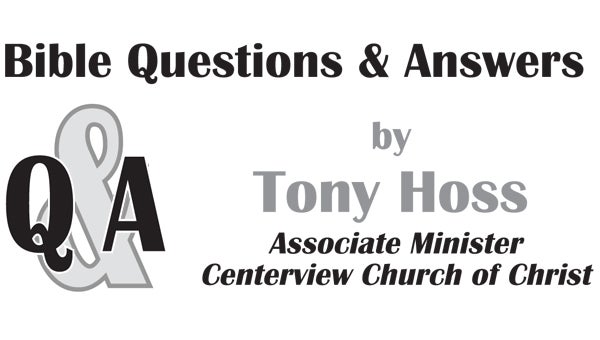Is a person responsible for the sins of their children?
Published 2:36 pm Thursday, June 25, 2020
|
Getting your Trinity Audio player ready...
|
A reader asks: “Is a person responsible for their children’s personal relationship with God after they leave the home? If so, what does this do to the qualifications of the elder?”
As we consider the first question, the answer is clearly seen in the scriptures. We read in Ezekiel 18:20, “The soul that sinneth, it shall die. The son shall not bear the iniquity of the father, neither shall the father bear the iniquity of the son: the righteousness of the righteous shall be upon him, and the wickedness of the wicked shall be upon him.”
Each person is responsible for their own relationship with God. When a person reaches the age of accountability (an age where they are fully aware of their sins and can be held responsible for their sins before God) whether the child is still in the home or not, they alone are responsible to God. So, the answer to the first part of this question is, “No, a person is not responsible for their children’s personal relationship with God after they leave the home.” We must know that parents are responsible to teach their children; training them and bringing them up in the nurture and admonition of the Lord (Ephesians 6:4). While parents may influence their child in the right direction and strive to teach that child to become a Christian one day, the decision to obey God belongs to the child and not to the adult. Again, this is a personal relationship between God and the individual person.
Next, we consider the qualification for an elder of having believing children as is found in Titus 1:6. It merely says, “having believing children” or “having children that believe.” Paul does not specify if these children are in the home or not. But if we look at 1 Timothy Paul it gives us some more information. In 1 Timothy 3:4-5, Paul said of Elders, “One that ruleth well his own house, having his children in subjection with all gravity; (5) (For if a man know not how to rule his own house, how shall he take care of the church of God?”
So, an elder is one who “ruleth well his own house, having his children in subjection with all gravity; (For if a man know not how to rule his own house, how shall he take care of the church of God?)” There is little doubt that Paul refers to children in the home. The conclusion is that an elder must have believing children in his home.
The root of the question is, can an elder become disqualified for the unfaithfulness of a child after they leave the home? Having these things in mind, the question is really this, “Can an elder become disqualified from being an elder if his child stops being faithful to God?” The answer then is no. A child who has left the home and become unfaithful cannot affect the qualification of the elder. If the elder has trained his children in such a way that they believed the gospel while living in his house and he meets all other requirements he is qualified. If children leave the house and go their own ways, and fall away from the faith, it has no bearing on the elder’s qualifications. We must conclude that the qualification is not one of the ongoing faith of the child, but rather, it is a qualification of the man who would become an elder. If a man met the qualification at the time that he was appointed to the eldership, he continues to meet that qualification because at the time he was appointed, he had believing children. In the end the elder will always be one, of whom it can be said that he raised his children to be believers.
(Questions/Answers is provided by Tony Hoss, minister of Centerview Church of Christ, Elizabethton.)






